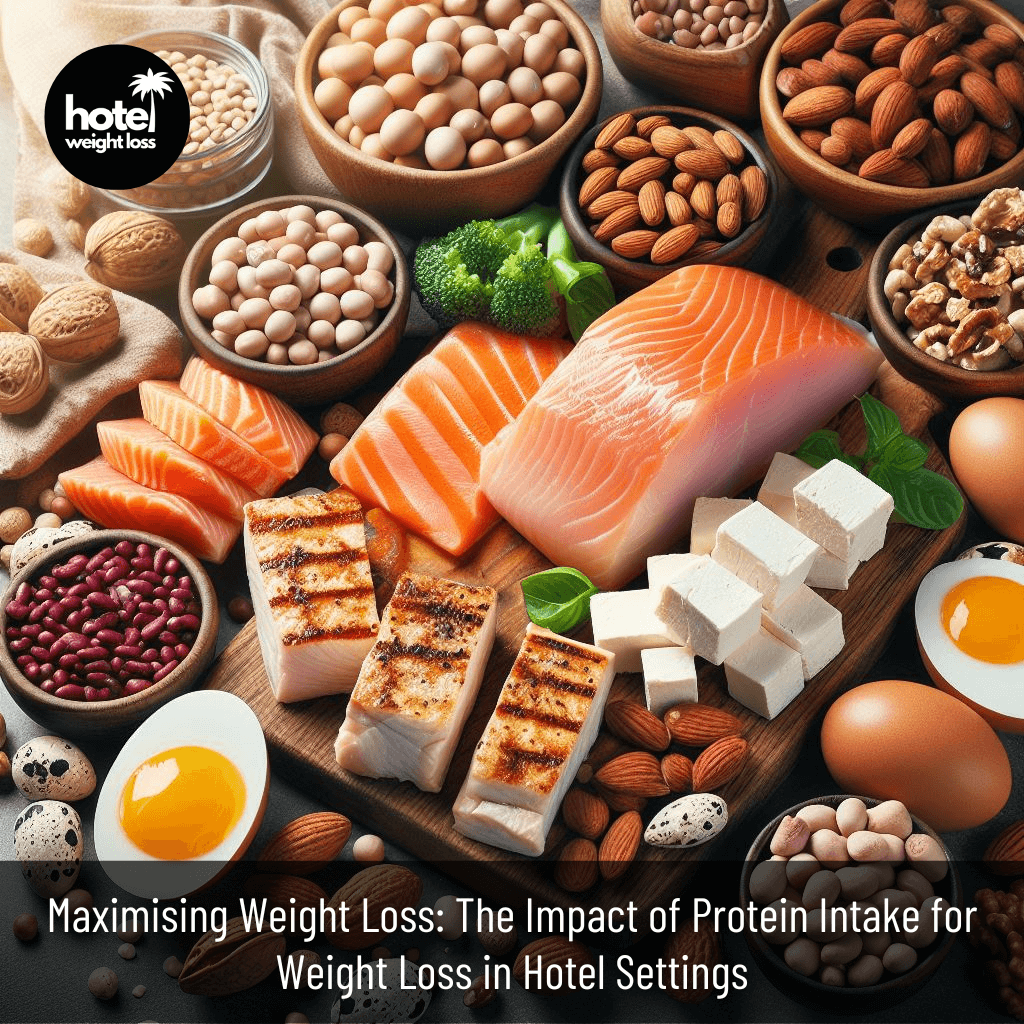The process of trying to lose weight can frequently feel like wading through a maze of contradicting advice and techniques. Yet, amidst this complexity, one aspect stands out as a beacon of clarity: protein intake for weight loss. Imagine a scenario where every meal in your hotel tantalises your taste buds and propels you closer to your weight loss goals. This isn’t simply wishful thinking; it’s the ability to comprehend how dietary protein affects weight reduction and maintenance. Come along as we study the science behind protein’s ability to help you lose weight, the nuances of the keto diet, and how Hotel Weight Loss can completely transform your weight loss experience.
Key Takeaways
- Protein intake for weight loss is essential for both dropping pounds and maintenance.
- It’s essential to comprehend how the ketogenic diet affects insulin resistance if you want to lose weight sustainably.
- Innovative weight loss techniques designed to maximise outcomes in a comfortable hotel environment are provided by Hotel Weight Loss.
The Science of Protein Intake for Weight Loss
The Importance of Protein Intake for Weight Loss
Protein intake for weight loss is not merely about building muscle; it’s a fundamental component of successful weight loss strategies. According to the groundbreaking research by Westerterp-Plantenga et al., increasing dietary protein leads to greater satiety and enhanced thermogenesis, ultimately resulting in improved weight loss outcomes. You can use protein’s metabolic edge to speed up your weight reduction journey by making protein-rich foods a priority in your hotel meals.
Protein’s Effect on Appetite Regulation
Have you ever experienced that post-meal slump where cravings hijack your willpower? Knowing how protein affects appetite regulation may be your best tool in the fight against these cravings. Nieuwenhuizen et al. elucidate how protein triggers the release of satiety hormones while suppressing hunger hormones, leading to reduced calorie intake and increased feelings of fullness. Choosing hotel menu items that are high in protein can help you efficiently suppress cravings and maintain your weight loss progress.

Protein’s Role in Boosting Metabolism
Unlock the key to effortless calorie burning with protein-rich meals. Tomé et al.’s research reveals that protein’s thermogenic effect significantly contributes to overall energy expenditure. Unlike fats and carbohydrates, protein requires more digestion energy, resulting in a higher metabolic rate. This metabolic advantage not only aids in weight loss but also promotes weight maintenance by preventing the dreaded rebound effect. Elevate your metabolism and amplify your weight loss efforts by embracing the protein-rich offerings at Hotel Weight Loss.
The Keto Diet and Insulin Resistance
Enter the realm of metabolic flexibility with the ketogenic diet—a revolutionary approach to weight loss and insulin resistance management. By minimising carbohydrate intake and prioritising fats and proteins, the keto diet shifts your body into ketosis, efficiently burning fat for fuel. Soenen et al.’s research underscores the keto diet’s efficacy in improving insulin sensitivity, making it a powerful tool for combating insulin resistance and promoting sustainable weight loss. Say goodbye to stubborn fat and hello to newfound vitality with the expert guidance of Hotel Weight Loss.
Overcoming Insulin Resistance with Keto Diet Strategies
Is insulin resistance thwarting your weight loss efforts? Don’t despair—embrace the transformative potential of the keto diet. Westerterp et al.’s study demonstrates how the keto diet effectively lowers blood glucose levels and enhances insulin sensitivity, paving the way for improved metabolic health and accelerated weight loss. By adhering to a low-carbohydrate, high-protein diet tailored to your needs, you can break free from the shackles of insulin resistance and embark on a journey towards sustainable wellness.
Conclusion
Embark on a transformative journey towards a healthier, happier you with the guidance of Hotel Weight Loss. By harnessing the power of protein intake for weight loss and embracing the ketogenic diet, you can unlock the secret to sustainable weight loss and optimal metabolic health. Say goodbye to fad diets and hello to a lifetime of wellness. Contact Hotel Weight Loss today to embark on your personalised weight loss journey and discover a world of possibilities.
Facts and Figures
Find below a figure from the original article comparing normal vs. High protein diets.

FAQs
What role does protein intake play in weight loss?
How much protein should I consume for effective weight loss?
Can I lose weight by increasing my protein intake alone?
How does protein intake for weight loss affect appetite and cravings?
Are there any risks associated with consuming too much protein for weight loss?
Can I still lose weight if I follow a vegetarian or vegan diet with lower protein options?
How does protein intake for weight loss impact metabolism and calorie burning?
Can protein intake help prevent muscle loss during weight loss?
How does protein intake for weight loss differ between weight loss and maintenance phases?
Can Hotel Weight Loss help me optimise my protein intake for weight loss?
Ready to take the first step towards a healthier you? Visit Hotel Weight Loss today and consult our expert health specialists to kickstart your weight loss journey. With personalised guidance and innovative keto diet strategies, we’ll help you achieve your goals and transform your life.
References
Westerterp-Plantenga MS, Nieuwenhuizen A, Tomé D, Soenen S, Westerterp KR. Dietary protein, weight loss, and weight maintenance. Annu Rev Nutr. 2009;29:21-41. doi: 10.1146/annurev-nutr-080508-141056. PMID: 19400750. Taken from: https://pubmed.ncbi.nlm.nih.gov/19400750/
D’Andrea G, Ostuzzi R, Bolner A, Francesconi F, Musco F, et al. 2008. Study of tyrosine metabolism in eating disorders. Possible correlation with migraine. Neurol. Sci. 29:S88–92. Taken from: https://pubmed.ncbi.nlm.nih.gov/18545905/
Azzout-Marniche D, Gaudichon C, Blouet C, Bos C, Mathe V, et al. 2007. Liver glyconeogenesis: a pathway to cope with postprandial amino acid excess in high-protein fed rats? Am. J. Physiol. Regul. Integr. Comp. Physiol. 292(4):R1400–7. Taken from: https://pubmed.ncbi.nlm.nih.gov/17158265/
Also, see 7 Best Science-Backed Ways High-Protein Diet for Weight Loss Ignites Your Journey




